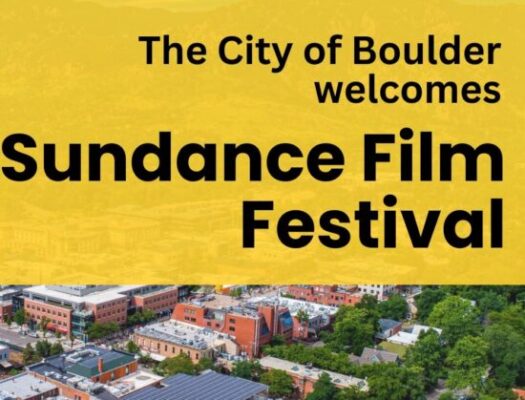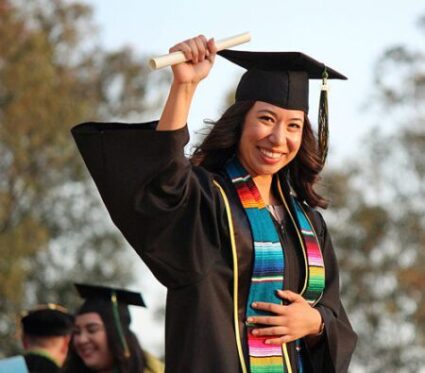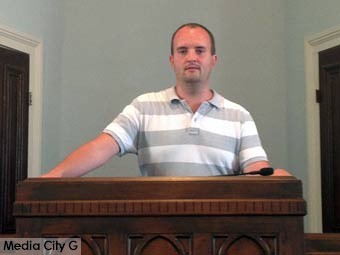
Photo of Glendale Church of Christ minister Bryan Schackmann inside Dexter Avenue Baptist Church Montgomery, AL August 12, 2015
My name is Bryan Schackmann and I’m the minister at the Glendale Church of Christ. Last week I got the chance to travel on a bus with 10 white and 10 black pastors from churches across the United States to important sites from the Civil Rights movement in Alabama. It was a powerful and unique opportunity and I’m glad I got the chance to do it.
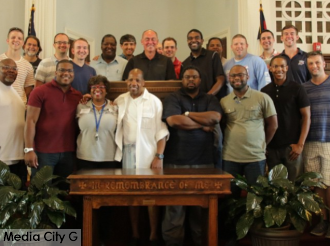
Ministers visited Dexter Avenue Baptist Church where Rev. Dr. Martin Luther King, Jr. preached Montgomery, AL August 13, 2015
We visited 16th St. Baptist Church in Birmingham, Dexter Avenue Baptist Church and Brown Chapel AME Church in Montgomery. These churches were actively involved in the movement and openly supported equal rights for African-Americans at a time when it was dangerous to do so. I was struck by how most of them are about the size of the church in Glendale where I preach.
While in Montgomery we stopped at the spot where on December 1, 1955, seamstress Rosa Parks, after a long day at work, refused to give up her bus seat to a male white passenger. Parks was arrested and convicted of violating the laws of segregation.
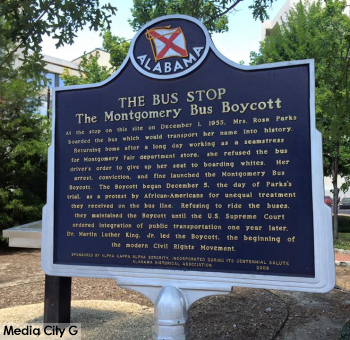
A sign commemorating the Montgomery bus boycott and Rosa Park’s act of civil disobedience Montgomery, Al August 12, 2015
Parks’ act of civil disobedience sparked a 381-day boycott of the Montgomery Bus System by blacks. The organizers of that boycott, a group of activists and ministers, chose as their leader Rev. Dr. Martin Luther King, Jr. In late 1956, the U.S. Supreme Court banned bus segregation as unconstitutional. The bus boycott was the beginning of mass non-violent demonstrations, which forced major changes in America on integration and civil rights.
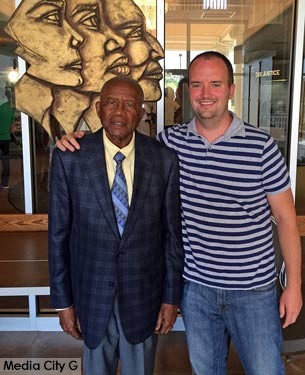
Civil rights activist/lawyer Fred Gray and Minister Bryan Schackmann at the Tuskegee Human and Civil Rights Multicultural Center Tuskegee, AL August 13, 2015
We got to hear some first hand impressions from Fred Gray, an activist and lawyer, who handled a number of key cases in the Civil Rights Movement, represented Dr. King several times, and Rosa Parks when she appealed her conviction.
Also, we toured Tuskegee University and the Edmund Pettus Bridge in Selma. It is on that bridge that 600 voting rights marchers were violently confronted by law enforcement on March 7, 1965. The incident became known as Bloody Sunday. However, two weeks later the march would begin again. By the time the march reached Montgomery, the number had grown to 25,000.
A few months later, President Lyndon Johnson signed the Voting Rights Act on August 6, 1965– barring state and local officials from using discriminatory tests and methods to deny blacks the right to vote. These events are depicted in the highly acclaimed 2014 movie “Selma.”
All of these experiences gave me a lot to think about. It was especially significant because I got to talk with my African-American colleagues and to hear from them about what these events still mean to them. What I found interesting is that most of them would mention a word first: Shame, which is what I and my white colleagues felt also.
To be honest I was surprised to hear my black friends mention that word. I understand why I’m ashamed — because I’m white. I’m from the side that did the oppressing. I suppose shame works both ways – both to the oppressor and the oppressed. And it continues to have a voice that echoes in both white and black hearts today. Shame isn’t something that’s easy to shake. It has a long, dark shadow. Racial tension and discrimination are still obvious issues. But there’s one thing that won’t help us to move further along the road of racial reconciliation: Shame.
Shame and guilt aren’t good motivations for change. They might help us to identify a problem, but they aren’t helpful in giving us the tools we need to move forward. Shame leads us to cynicism. Instead, I try to choose hope. Hope that I can help be part of change with my actions. Hope that America can learn from her past.
I’m trying to ask myself hard questions: What part can I play to continue to make a difference in racial reconciliation? How do I see discrimination in my neighborhood and community and what can I do to help?
These questions help me to see the possibilities of not only a better future – but a better present.
###
Bryan Schackmann is a graduate of Pepperdine University and Abilene Christian University and the pulpit minister at Glendale Church of Christ 2021 W Glenoaks Boulevard in Glendale. Phone number (818) 843-3636. He will be sharing more about his experiences from this trip with the congregation on Sunday, August 30 at 9:30 a.m. (disclosure: Media City Groove Editor, Fronnie Lewis, is a member of this church)
Note: All photos courtesy Bryan Schackmann

